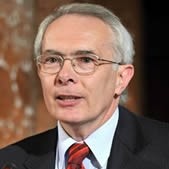Péter Ákos Bod
PÉTER ÁKOS BOD (Szigetvár, 1951) economist, university professor. He worked in economic research at the Institute of Planning, Budapest, taught economics in Budapest and in the US before 1989. He was Minister of Industry and Trade between 1990 and 1991, and Governor of the Hungarian National Bank between 1991 and 1994. In 1995–1998, he was member of the Board at the European Bank for Reconstruction and Development (London), representing East Central European countries. At present, he is director of the Institute of Economics at Corvinus University of Budapest. He is vice chairman of the Hungarian Economic Society, sits on editorial boards of Hungarian journals (incl. this Review). His major publications include A vállalkozó állam (Entrepreneurial State) 1987; A pénz világa (The World of Money) 2001; Gazdaságpolitika (Economic Policy) 2002; Közgazdaságtan (Economics) 2006.

